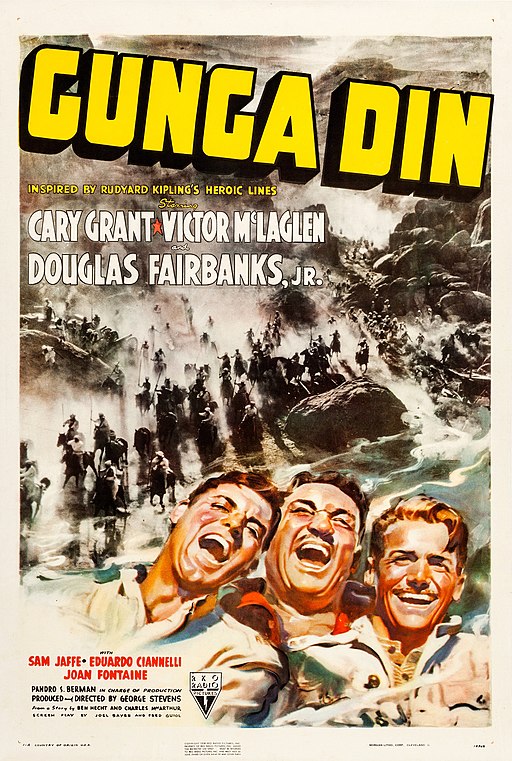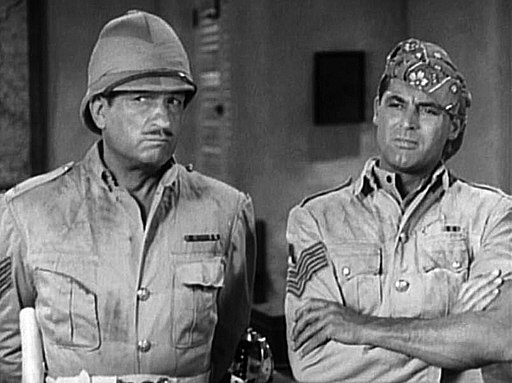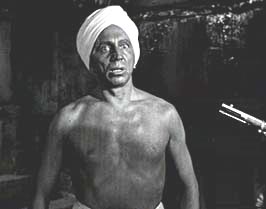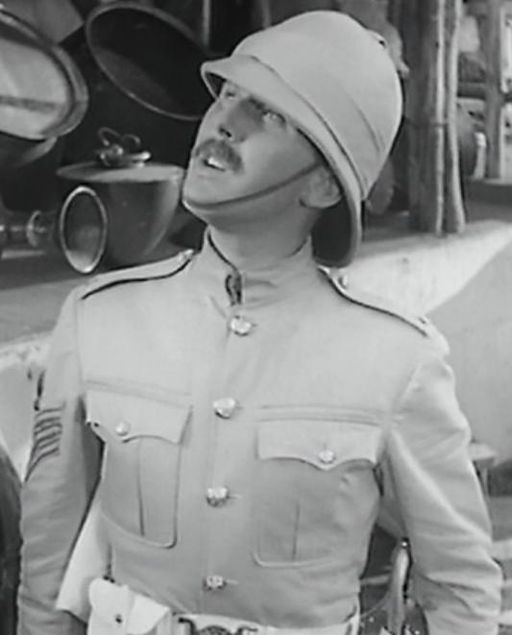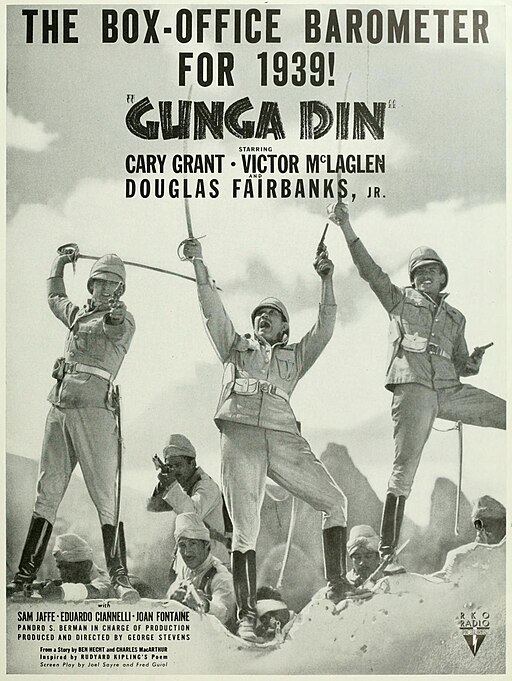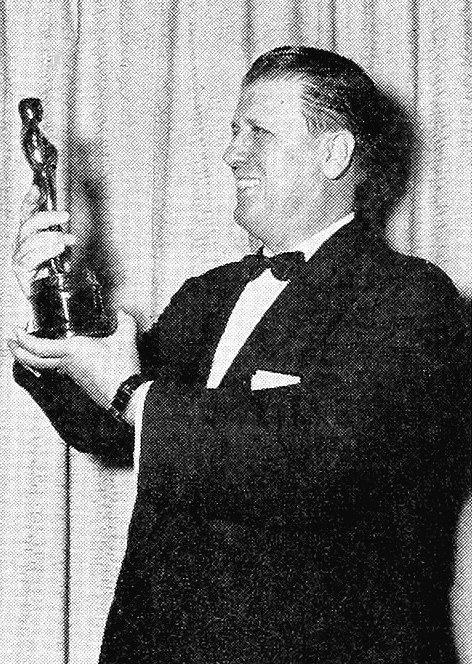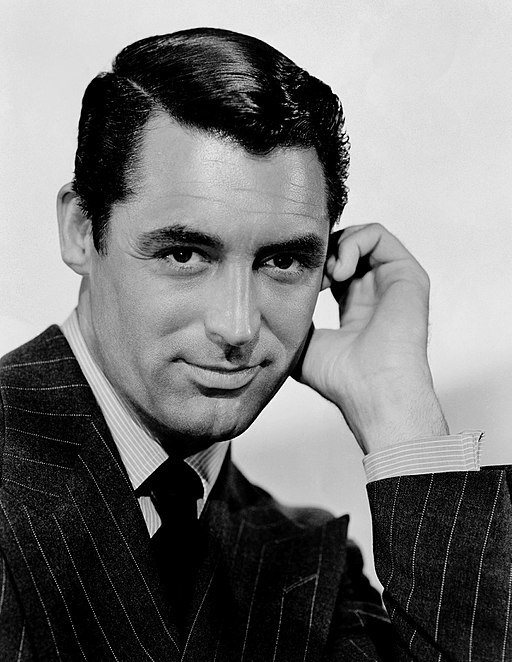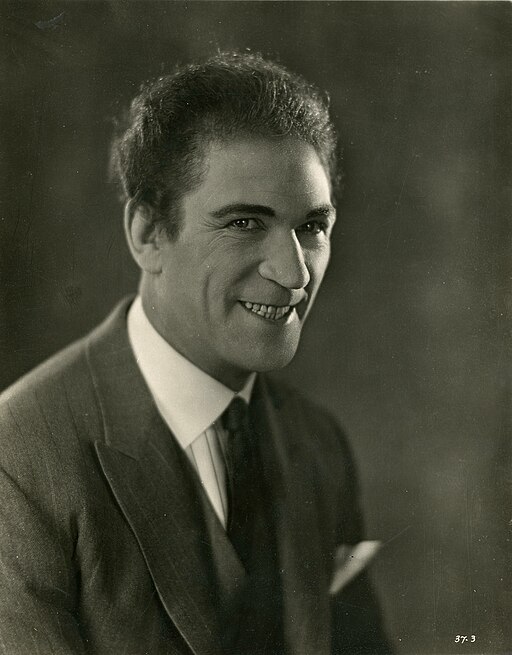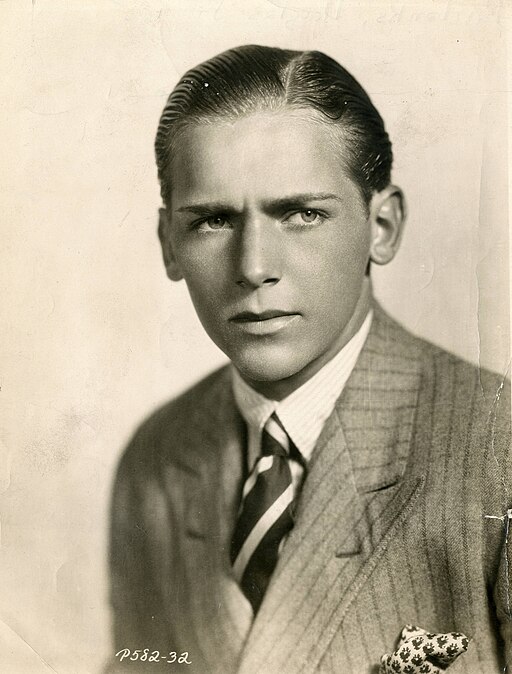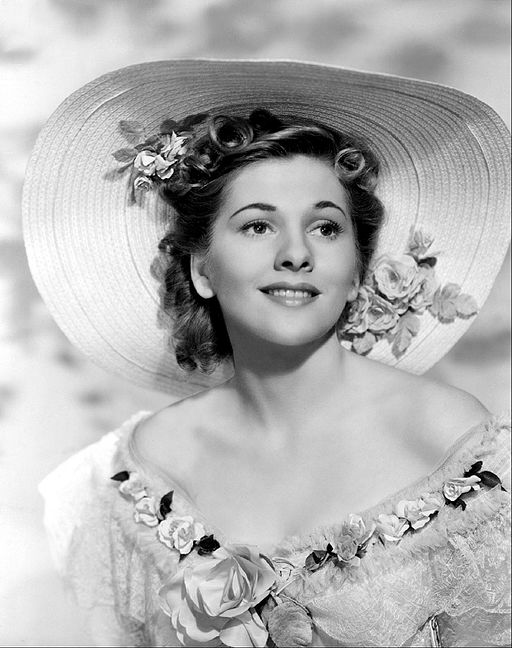Gunga Din - 1939
back| Released by | RKO Radio Pictures |
| Director | George Stevens |
| Producer | George Stevens |
| Script | Joel Sayre, Fred Guiol (based on the poem by Rudyard Kipling and a screenplay by Ben Hecht and Charles MacArthur) |
| Cinematography | Joseph H. August |
| Music by | Alfred Newman |
| Running time | 117 minutes |
| Film budget | $2 million |
| Box office sales | $3 million |
| Main cast | Cary Grant - Victor McLaglen - Douglas Fairbanks Jr. - Joan Fontaine - Sam Jaffe |
Gunga Din
A Thrilling Tale of Camaraderie and Heroism in Colonial India
"Gunga Din" is a classic 1939 adventure film directed by George Stevens. Inspired by Rudyard Kipling's poem of the same name, the film is set in British India and follows the story of three British sergeants and their water bearer, Gunga Din, who dreams of becoming a soldier.
The film is renowned for its adventurous spirit, camaraderie, and dramatic action scenes, culminating in a climactic battle at a temple fortress. Despite the initial high production costs, it achieved success at the box office and has since become a celebrated part of cinematic history.
Related
Gunga Din – 1939
Summary of "Gunga Din"
Gunga Din is set in colonial India during the British Raj and follows the adventures of three fun-loving sergeants: MacChesney (played by Victor McLaglen), Cutter (Cary Grant), and Ballantine (Douglas Fairbanks Jr.). The trio is part of the British Army, tasked with maintaining order and battling a murderous cult known as the Thuggees, who are intent on overthrowing British rule.
The film opens as Ballantine considers leaving the army to marry his fiancée, Emmy Stebbins (Joan Fontaine), much to the dismay of his comrades who concoct plans to keep him in the service. Amid these personal conflicts, the sergeants encounter Gunga Din (Sam Jaffe), a brave and loyal water bearer who aspires to be a soldier himself.
As the plot unfolds, the sergeants are sent to investigate the telegraph lines in a remote village, only to discover it's a trap set by the Thuggees. Captured and facing death, they are unexpectedly rescued by Gunga Din, who had followed them against orders. Inspired by his bravery and having overheard the Thuggee plans, the sergeants escape to warn the regiment.
In the film's climax, Gunga Din, despite being mortally wounded, climbs to the top of a temple to blow a bugle, warning the regiment of an impending ambush. His act of valor not only saves the lives of many but also fulfills his dream of becoming a soldier. The film ends with a poignant scene where Gunga Din is posthumously honored as a hero, and the British regiment salutes him.
Analysis of "Gunga Din"
Themes and Motifs:
- Heroism and Sacrifice: Gunga Din's character embodies the themes of heroism and sacrifice. His ultimate sacrifice symbolizes his deep loyalty and courage, themes that resonate strongly throughout the film.
- Colonialism: The film reflects the era's colonial attitudes and perspectives, portraying the British as the civilizing force and the natives as either loyal servants or savage rebels. This portrayal invites scrutiny from modern perspectives, considering the complex realities of colonial rule.
- Comradeship: The strong bond among the three sergeants highlights the theme of comradeship. Their playful banter and deep loyalty provide the film's emotional core, juxtaposed against the backdrop of military duty and personal desires.
Cinematic Techniques:
- Adventure Genre Elements: "Gunga Din" is crafted in the spirit of classic adventure films, complete with daring exploits, dramatic battles, and picturesque settings. The film uses expansive cinematography to capture the rugged landscapes and the scale of battle scenes.
- Character Development: The characters of the sergeants and Gunga Din are well-developed, each displaying unique traits that contribute to the film's dynamics. Their interactions and individual arcs drive the narrative forward.
Cultural Impact:
Despite its adventurous allure and critical acclaim, "Gunga Din" has been critiqued for its depiction of colonial stereotypes and its romanticized view of British imperialism. However, it remains a significant work for its technical achievements and its influence on the adventure genre in Hollywood.
In summary, "Gunga Din" is a cinematic classic that combines high adventure with a poignant exploration of themes like heroism and loyalty. Its legacy is complex, admired for its storytelling and cinematic scope but also critiqued for its outdated portrayal of colonial relationships.
Classic Trailer Gunga Din:
Full Cast:
- Cary Grant as Sergeant Archibald Cutter
- Victor McLaglen as Sergeant MacChesney
- Douglas Fairbanks Jr. as Sergeant Thomas Ballantine
- Sam Jaffe as Gunga Din
- Eduardo Ciannelli as Guru
- Joan Fontaine as Emmy Stebbins
- Montagu Love as Colonel Weed
- Robert Coote as Corporal Bertie Higginbotham
- Abner Biberman as Chota
- Lumsden Hare as Major Mitchell
- Charles Bennett as Telegraph Operator
Analysis of the Direction of George Stevens:
George Stevens, the director of "Gunga Din," is renowned for his meticulous and thoughtful approach to filmmaking, and his work on this film exemplifies several key aspects of his directorial style.
Attention to Detail and Scope
Stevens was known for his meticulous attention to detail and the expansive scope of his films. In "Gunga Din," he adeptly manages a large cast and complex action sequences that include massive battle scenes and dramatic landscapes. His direction ensures that the grandeur of the setting never overshadows the human elements of the story, allowing the characters' personalities and relationships to drive the narrative.
Handling of Action and Comedy
One of George Stevens' remarkable abilities was to blend genres, integrating action with comedy and drama seamlessly. "Gunga Din" is a prime example, balancing thrilling action sequences with light-hearted moments and camaraderie among the sergeants. Stevens' expert timing in comedy is evident in the playful banter between the characters, particularly the trio of sergeants, whose interactions provide relief amidst the tension of battle.
Character Development
Stevens excelled in drawing out complex performances from his actors, and "Gunga Din" showcases this through its character development. Each character is well-rounded and distinct, from Cary Grant's roguish charm to Sam Jaffe's earnest portrayal of the titular character. Stevens' direction allows each actor to bring depth to their roles, enhancing the film's emotional impact.
Cinematic Techniques
George Stevens used a variety of cinematic techniques to enhance the storytelling in "Gunga Din." His use of wide shots captures the vastness of the Indian landscapes, which serves as a dramatic backdrop to the human drama unfolding in the foreground. Close-ups and medium shots are effectively used to focus on character interactions and emotional moments, particularly during key scenes such as Gunga Din's heroic final act.
Handling of Themes
Under Stevens' direction, the film explores themes of bravery, loyalty, and the complexities of colonialism. While the film reflects the era's typical portrayal of colonial dynamics, Stevens also infuses the narrative with a sense of respect and heroism through the character of Gunga Din, who, despite being a native, is portrayed as the true hero of the film.
Legacy and Influence
Stevens' work on "Gunga Din" had a lasting impact on the adventure genre, setting a high standard for subsequent films with its effective blend of action, character, and humor. His ability to handle large-scale productions with a keen eye for detail and character-driven stories became a hallmark of his career, seen later in more dramatic works such as "A Place in the Sun" and "Giant."
Splendid Performance by Cary Grant:
Cary Grant's performance in "Gunga Din" is a quintessential display of his charismatic screen presence and versatility as an actor. In the film, Grant plays Sergeant Archibald Cutter, a role that allows him to showcase his ability to blend comedy, action, and drama—elements that would define much of his career.
Charismatic Presence
Grant brings a dynamic energy to the character of Sergeant Cutter, a cheeky and adventurous soul, who is both daring and humorous. His natural charm is evident in every scene, whether he's engaging in witty banter with his fellow sergeants or executing a daring escape. Grant's charismatic screen presence not only enhances his own role but also elevates the performances of his co-stars, creating a lively and engaging dynamic among the trio of soldiers.
Comic Timing
One of Cary Grant's most celebrated traits was his impeccable comic timing, which is on full display in "Gunga Din." He delivers lines with a precision that maximizes the humor of each moment. His physical comedy, especially in scenes where he must deal with the unpredictability of the situations the sergeants find themselves in, adds a layer of entertainment that balances the more serious elements of the film.
Adventurous Spirit
In "Gunga Din," Grant embodies the adventurous spirit of the classic Hollywood leading man. His portrayal of Sergeant Cutter is filled with vigor and bravery, particularly in action sequences. Grant performs these scenes with a sense of ease and confidence, making his character's heroics believable and compelling. His ability to transition smoothly between action and comedy underscores his skill as an actor, capable of handling diverse roles.
Dramatic Ability
While "Gunga Din" is largely an adventure-comedy, there are moments that call for a deeper emotional range, and Grant rises to these occasions. His interactions with his fellow sergeants, especially in scenes concerning their brotherly bonds and the conflict over Ballantine's impending marriage, reveal a more nuanced side of his character. Grant conveys a genuine sense of loyalty and concern, which makes the film's themes of friendship and sacrifice more resonant.
Chemistry with Co-Stars
Grant's chemistry with Victor McLaglen and Douglas Fairbanks Jr. is another highlight of his performance. The trio's rapport feels authentic, adding depth to their characters' relationships. This chemistry is crucial for the film, as it relies heavily on the dynamics among the three sergeants to drive the story forward.
Analysis of the Performance of Victor McLaglen:
Victor McLaglen's performance in "Gunga Din" as Sergeant MacChesney exemplifies his ability to blend robust masculinity with a touch of vulnerability, creating a memorable and compelling character. McLaglen, known for his physically imposing presence and rugged persona, brought these traits to his role, making him a perfect fit for the boisterous and brawny sergeant.
Commanding Presence
McLaglen's stature and forceful demeanor naturally conveyed authority and toughness, critical attributes for his role as one of the sergeants tasked with maintaining order in the colonial setting. His presence on screen is commanding, drawing viewers' attention in every scene he appears. McLaglen utilizes his physicality effectively, making his character's combat scenes particularly convincing and engaging.
Comedic Flair
Despite his tough exterior, McLaglen had a knack for comedy, which he skillfully incorporates into his performance. His interactions with Cary Grant and Douglas Fairbanks Jr. provide a source of humor and lighten the film's tone, creating a balance between the intense action sequences and lighter moments. McLaglen's ability to deliver comic lines with a deadpan expression adds to the humor, making his character not only formidable but also endearing.
Emotional Depth
Victor McLaglen also brings an emotional depth to Sergeant MacChesney, displaying moments of genuine concern and loyalty towards his fellow sergeants and Gunga Din. This depth is particularly evident in scenes where he must reconcile his duty as a soldier with his personal bonds, highlighting his ability to convey a range of emotions. McLaglen's portrayal shows that beneath the tough exterior lies a character capable of compassion and camaraderie.
Chemistry with Co-Stars
The chemistry between McLaglen and his co-stars is a critical element of his performance. His interactions with Grant and Fairbanks create a believable and dynamic portrayal of military brotherhood. The trio's rapport feels authentic and is key to conveying the film's themes of friendship and loyalty. McLaglen's role as the somewhat gruffer sergeant complements the personalities of his counterparts, adding to the group's collective charm.
Impact on the Film
McLaglen's performance contributes significantly to the film's impact, offering a mix of humor, action, and heart. His portrayal of Sergeant MacChesney adds a layer of complexity to the narrative, enriching the storyline and making the character memorable. McLaglen's ability to handle both the physical demands of the role and the emotional subtleties of his character showcases his skills as an actor and his importance in "Gunga Din."
Notable Quotes from the Film:
Sergeant Cutter (Cary Grant): "You're a better man than I am, Gunga Din."
This line, inspired by the Rudyard Kipling poem from which the film takes its name, is perhaps the most famous from the movie. It is spoken by Sergeant Cutter in recognition of Gunga Din's bravery and selflessness at the film's climax.
Sergeant MacChesney (Victor McLaglen): "We have our orders. Get the men together."
A line that underscores the disciplined, duty-bound nature of the British soldiers, particularly highlighting MacChesney's leadership and commitment to their mission.
Sergeant Ballantine (Douglas Fairbanks Jr.): "Here's to us. Who's like us? Damn few."
This toast captures the strong bond and exclusive camaraderie shared among the three sergeants, emphasizing their brotherly affection and mutual respect.
Gunga Din (Sam Jaffe): "I want to be a soldier like you."
Gunga Din's expression of his aspiration, which drives his actions throughout the film and ultimately defines his character's heroic trajectory.
Sergeant Cutter: "Din! Din! You're going to get a chance to use that carbine. Think you can do it?"
This quote from Cutter to Gunga Din during a crucial moment highlights the trust and recognition that the sergeants eventually give to Gunga Din, acknowledging his part in their ranks.
Colonel Weed (Montagu Love): "You are ordered to return to your regiment at once."
This command from Colonel Weed to the sergeants showcases the military hierarchy and the ongoing conflict between duty and personal desires within the film.
Awards and Recognition:
"Gunga Din" from 1939, directed by George Stevens, did not receive any Academy Award nominations, which might be surprising given its enduring popularity and significance in film history. At the time of its release, the film was well-received and has since become regarded as a classic adventure film. However, it was not recognized by the Oscars or other major award ceremonies during its contemporary period.
Despite the lack of formal awards or nominations, "Gunga Din" has been celebrated for its technical achievements, direction, and performances. It has also been recognized by various film preservation institutions for its cultural, historical, and aesthetic significance:
In 1999, "Gunga Din" was selected for preservation in the United States National Film Registry by the Library of Congress as being "culturally, historically, or aesthetically significant."
This recognition underscores the film's lasting impact on the industry and its historical importance, compensating for the oversight at the major award ceremonies at the time of its original release.
Classic Scenes from the Movie:
- The Bridge Battle Scene: One of the film's most thrilling sequences occurs when the British regiment faces off against the Thuggee cult on a bridge. This scene is a masterclass in action choreography and suspense, showcasing the dangers the characters face and their bravery. The dynamic camera work and intense action highlight George Stevens' ability to craft compelling battle scenes that remain engaging and visually impressive.
- The Temple Trap: Another standout moment is when the sergeants investigate a seemingly deserted temple and fall into a trap set by the Thuggees. This scene effectively combines suspense and a sense of foreboding as the sergeants realize they have walked into an ambush. The claustrophobic setting inside the temple, paired with the realization of impending danger, adds to the scene's intensity.
- Gunga Din's Heroic Sacrifice: Perhaps the most poignant scene in the film is Gunga Din's final act of bravery. Despite being fatally wounded, he climbs to the top of the temple to blow a bugle and warn the regiment of an ambush. This scene is not only crucial to the plot but also deeply emotional, as it fulfills Gunga Din's dream of being a soldier and underscores the themes of sacrifice and heroism. The slow-motion effect as Gunga Din falls, combined with the solemn music, makes this a particularly moving and memorable sequence.
- The Poetic Recitation: Early in the film, there's a lighter, more reflective moment where the poem "Gunga Din" by Rudyard Kipling is recited. This not only serves as a narrative device to introduce the character of Gunga Din but also sets the tone for the themes of loyalty and bravery that will pervade the film.
- The Elephant Escape: A scene filled with both humor and suspense features Cary Grant's character, Sergeant Cutter, using an elephant to escape from the Thuggee-controlled village. This sequence showcases Grant's comedic timing as well as the adventurous spirit of the film. The interaction between Cutter and the elephant adds a comedic layer to the otherwise tense escape.

